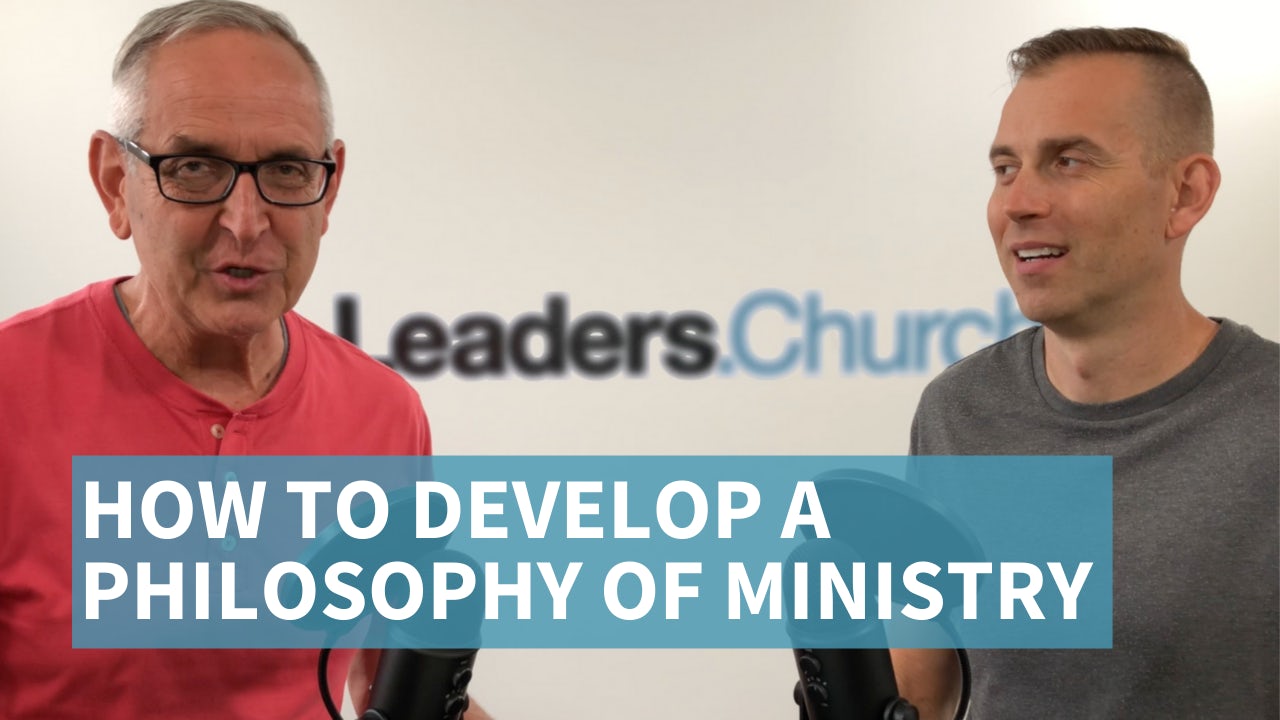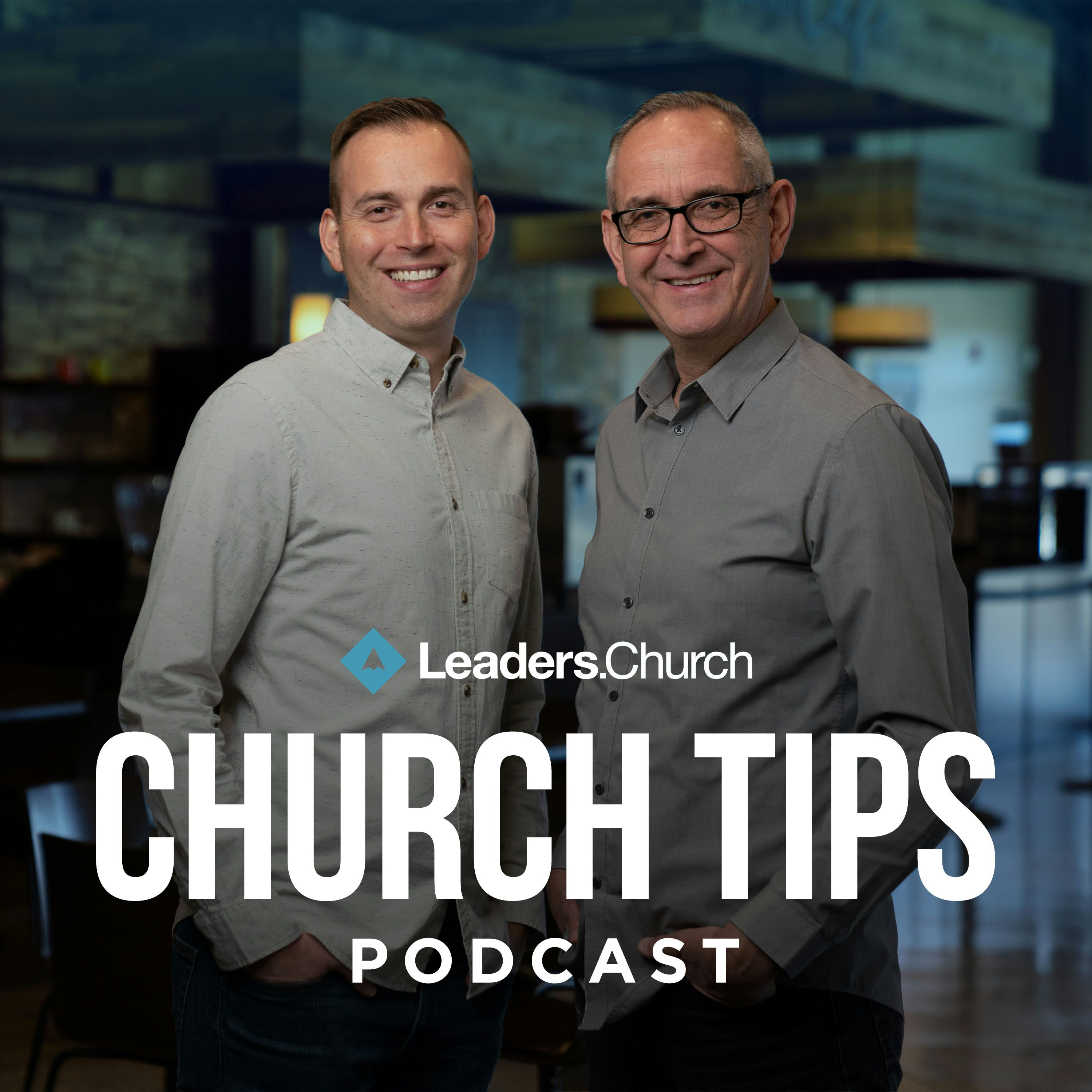024 – How to Develop a Philosophy of Ministry
What’s in this Episode?
What do you think of when you think of philosophers? I mean, you got a college professor, maybe a beard, the bow tie, the wild, crazy hair? Is that you as a pastor? Probably not, but you know, the philosophy of ministry is absolutely critical and your ability to develop it and move it through the culture of your church is absolutely critical. How do you develop a philosophy of ministry? You’ve come to the right place, because that’s exactly what we’re going to talk about today.
Read the Transcript
Dick Hardy 0:32
You know, I’ve known of these two churches over the years, both great churches, but they really went two different directions in terms of the application of their ministry going forward. One was a church that had a philosophy of ministry that was very clear. They were not legalistic in their approach in ministry, they were very focused, and they were intent on accomplishing mission. The other church was all over the map. And their philosophy of ministry was really whatever the trend of the day was. So they were here then they were there. They were all over the place. Needless to say, the church with the more focused and clear philosophy of ministry experienced much more growth and frankly, the spiritual component of the church was much greater because of that focus. And that is very, very real. And that’s exactly what we’re going to talk with you about today in the discussion of philosophy of ministry.
Special Announcement: Kids Ministry Track Launch
Jonathan Hardy 1:29
Yeah, we want to talk about how to develop a philosophy of ministry. And so we’re going to jump in real quick, but actually, before we do, I want to just mention, today’s a very special day because we have launched a brand new course for churches, specifically on the area of kids ministry. And so this is applicable for kids ministry pastors, or if you have a leader in the church who leads the kids ministry as a volunteer. We launched, today, a 44 video course called the Kids Ministry Track. It’s part of our church University online education for pastors. These are more full blown courses kind of like, basically like a class, but it’s all online, that they can get access to all the videos, the discussion guides, the content, and resources that are part of it to help the kids ministry, really go to the next level and help you to reach the the kids, this next generation of kids, especially given the challenges we face today with so much vying for their attention and their time and their focus and how can we make the kids ministry, one of the highlights of their week.
Dick Hardy 2:34
We want the kids ministry to be the number one thing those kids want to be involved with and this Kids Ministry track is going to help you get there.
Jonathan Hardy 2:41
Absolutely, so go to churchuniversity.com and you can click there to see the details about the course today. Of course, we’d love to have you check it out and enroll in it if that works for you. So with that being the case, hey, we want to jump back into the philosophy of ministry and there’s really five parts on how to develop a philosophy of ministry. And so Dick, why don’t you kick this off for us?
Dick Hardy 3:01
Well, yeah, great, Jonathan, you know, the other five parts we’re going to talk about. So you can keep this straight if you’re taking notes, the first four are really in the purview of the pastor and the board. And the last one is in the purview of the pastor and the staff or the pastor and his or her key volunteers are lay people. Their team.
#1: Worldview
Dick Hardy 3:22
But the very first one is one that we don’t talk about much because it’s just part of who we are. And that’s the worldview. What is your church’s worldview? Now, somebody may say, Well, I don’t know. Here’s a worldview. A worldview is: “people matter to God.” That’s one kind of worldview. Now, I’m going to bet you don’t go in on Sunday morning and say, “hey, do you know people matter to God? Because we all know that. It’s a world view. And because people matter to God, then the rest of the things happen. Love in a family. This is my son. I’m his dad. You know, while we would express love to each other, every morning, we’re not getting up and saying I love you or that to our spouse or children or grandchildren because it’s a known inside our family. That’s a worldview inside our family. So your church has a worldview, and it’s the responsibility of the pastor and the board to be able to articulate that worldview, certainly within the context of the board.
#2: Mission
Jonathan Hardy 4:31
Yeah, that’s good. Second part of how to develop a philosophy of ministry is the mission. So, we have a mission and the church, big church, big C, we have a mission to reach the lost. I mean, you know, reach spiritually lost people. And so your local church, your body that you’re leading, is going to have a mission, something along those lines. To reach spiritually lost people. Now the way you word it, you know, it might be different, but as you In the board, as the pastor and the board are working on this and you’re developing this mission, this is your why. Why is it we’re doing what we’re doing? Why is it that we meet every week? Why is it that we’re offering these ministries? Why is it that we do this tactic and this method and strategy and this and that? Well, why is it? We need to, as a pastor and board come together, we need to develop this mission, if we haven’t articulated it, what are we trying to accomplish? And obviously, like I said, it usually flows something along the lines of reaching spiritually loss people which is the thing that we are called to do as a church, but really articulating that is very helpful.
#3: Core Values
Dick Hardy 5:40
Exactly, exactly. The third part of developing a philosophy of ministry is core values. Core values is that which is central to you. It’s central to what’s important to you. You might have the actual thing that’s happening, but you might have an ideal of what you aspire to. So, a core value is again, it’s Central. Discipleship is a core value. Worship is a core value. Prayer is a core value. And normally you’re not going to have a zillion core values. I’ve seen churches with five core values, seven core values, maybe 10, at the tops, but you’re going to have a very defined… and those three that I just mentioned, discipleship, worship, prayer, those are core values, reaching spiritually lost people, the evangelism component. Maybe I have seen churches that have a style of preaching. Expository preaching, preaching from the word, is a core value children and youth might be. So these are samples of core values you could have and it’s the role of the pastor of the board to develop these core values and to protect these core values as they move forward.
#4: Goals
Dick Hardy 7:02
Then, flowing out of that, you have goals. Now, goals would be different from core values in that goals would be something you intend to see happen, that would fulfill a core value. So let’s suppose your core value, let’s talk discipleship, core value of discipleship, and back in the day, we would know that adult discipleship used to happen in the form of Sunday school. And then it shifted began to start happening in the context of life groups. Yeah, well, you might set a goal to say, “okay, we used to have four adult Sunday school classes, but now we want to develop 12 or 15 life groups, small groups. That’s a goal to accomplish a core value or to drive to the core value. A goal is forward thinking. And it’s not backwards. It’s not to what we used to do, but it’s how do we move forward. Setting goals is critical for the pastor and the board as they move forward.
Jonathan Hardy 8:15
Yeah, that’s good.
Dick Hardy 8:16
So the fifth piece.
#5: Strategy
Jonathan Hardy 8:17
Yeah, the fifth one, I want to mention is strategy. This is the practical. This is the methods, the tactics, the things that you do to accomplish those goals. And so, you know, when you’re adhering to your worldview, and your mission, your core values, you’re looking at the goals, you have to have a strategy and this is where really the pastor, the staff, if you have paid staff, or if it’s non paid staff, it’s the key leadership. Yeah, this is where they come into play. And they really are implementing the strategy of what you’re doing to be able to move the ministry forward. And so the methods and the tactics, the strategies, these things can change over time, because what worked at one point might change as society changes, and so we need to constantly be evolving. Those strategies can change all they want. The mission will never change. And so I think it’s important to have that distinction as we develop this philosophy of ministry is to know, to hold those strategies loosely, maybe that might be a way to say it, because that’s going to change and evolve over time. But the mission and what we’re trying to accomplish, will never change?
Dick Hardy 9:27
Exactly right.
Jonathan Hardy 9:28
So, there we go.
Recap:
Dick Hardy 9:29
Yeah, and you know, I think an important thing to remember as you’ve taken notes on these five things, is that those first four things, if I can just go ahead and recap, in the context of philosophy of ministry, the development of worldview, the development of mission, core values, and goals, those are all of the purview of the pastor of the board. Then you’ve got the fifth piece, which is the development of strategy that’s the purview of the pastor and his or her team. And so you, the pastor, of course, is in both worlds. You know, if I were drawing this, as I have on some occasions where I draw a line across, you know four things above and one thing below, when the pastor and board stay in the four things above, and the staff and the pastor stay in the one thing of below, you’ll see the greatest opportunity for the fulfillment of the philosophy of ministry. Now the pastor’s in all of those, but when you get people dabbling over the lines, that’s where conflict comes up. And that’s where the philosophy of ministry starts getting muddled. So stay tuned to worldview, mission, core values, and goals with the pastor and board, and then strategy in the purview of the team. So there you go, Jonathan, wrap this thing up.
Jonathan Hardy 10:47
Well, that’s great.
Dick Hardy 10:47
That is the wrap up, but I mean, we want to talk again about the launch today.
Jonathan Hardy 10:52
Yep. Make sure if you need to invest or you want to invest in the kids ministry program at your church, one of the greatest ways to do that is to just resource your kids pastor, your key kids ministry leaders. And you can do that by signing up for the Kids Ministry Track, which is part of our church university online education for pastors, you go to churchuniversity.com, you’ll see the link there to check out the kids ministry track. It launched today.
Dick Hardy 11:18
Yeah, we are so excited.
Jonathan Hardy 11:20
Yeah, it’s going to be great. We hope to have you check that out. And then, as well, make sure to subscribe if you have not subscribed on YouTube or on the podcast platform you are listening to this episode. And we would certainly love to have you rate and review this podcast episode. So that way, you are helping us get feedback and you are helping other people see and get the word out to them as well. So thank you so much for being with us today. We’ll look forward to seeing you next time.









